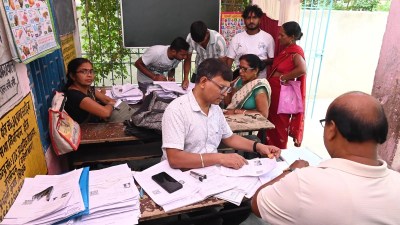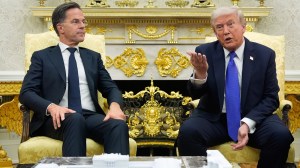Obama won’t meet G20 leaders at summit
The world is waiting for President-elect Barack Obama, and some of its most prominent leaders are flying into the US this weekend clamoring to meet him.

The world is waiting for President-elect Barack Obama, and some of its most prominent leaders are flying into the United States this weekend clamoring to meet him. But they will have to keep on waiting.
The leaders of 19 foreign powers — including Britain, France, Germany, Russia and China — converge on Washington on Friday for an emergency economic summit meeting hosted by President Bush. Although invited, Obama has opted to stay in Chicago and will not meet any of the leaders separately.
Coming so soon after last week’s election, the summit meeting has proved an uncomfortable moment for the President-elect and an early test of his handling of international diplomacy. Even as aides are closing his campaign headquarters and just beginning to assemble a governing team, they are fending off interest from foreign governments eager to take the measure of Obama and trying to avoid tying him to the Bush administration.
Several Obama advisors used the word “awkward” to describe the situation. But Robert Gibbs, a senior advisor to Obama, said: “While some may say it’s awkward that he’s not there, it would be far more problematic to be there. We firmly believe there is only one President at a time.”
The situation has already fostered misunderstandings. A Kremlin official told reporters in Moscow that President Dmitri A Medvedev of Russia would probably meet Obama during his trip to the US this weekend, even though the Obama camp has ruled that out.
The potential for even more significant misunderstanding was underscored last weekend when a quick, seemingly perfunctory telephone call by Obama returning the congratulatory call of Poland’s President led to a dispute about what was said about missile defence. If confusion over such a delicate issue could arise from a roughly five-minute phone call, Obama advisors reasoned, then the prospect of longer encounters in person with foreign leaders at this point would be fraught with peril. He has not even designated a Secretary of State, Treasury Secretary or National Security Advisor.
Instead, the Obama team is scrambling to arrange for surrogates to meet with visiting foreign officials while emphasising that Bush remains the nation’s leader until January 20. “It’s not appropriate for two people to show up for this meeting,” said John D Podesta, co-chairman of Obama’s transition team.
The White House expressed no disappointment and vowed to work closely with the President-elect. “We continue to work with the transition team on the financial summit and will keep them up to date,” said Gordon Johndroe, a White House spokesman. Foreign affairs veterans said Obama was trying to avoid being forced to take positions on matters he is not yet authorised to decide, much less take ownership for the problems and decisions of Bush.
“I sort of understand why he can’t go to that meeting,” said Rep Howard L Berman, chairman of the House Foreign Affairs Committee. “What if the administration makes a suggestion that he doesn’t agree with? Should he pop up and say something? Is his silence acquiescence? I think he’s making the right call.”
The period between an election and inauguration has often fostered tension when it comes to foreign affairs. Lyndon B Johnson wanted his successor to support peace talks with North Vietnam and arms talks with the Soviet Union, but Richard M Nixon undercut those efforts. The first President Bush sent troops to Somalia after his re-election defeat but before Bill Clinton’s inauguration.
The protocol for making first contacts with foreign leaders can be complicated and delicate. New presidents have traditionally made Canada’s prime minister the first foreign leader they meet with after taking office, a nod to its singular status as the nation’s neighbour and trading partner.
Obama called for “a globally coordinated effort with our partners in the G-20” during a campaign stop in Miami in September. But some of his advisors said the timing of the gathering this week was not their choice and wished there were a graceful way to call it off or at least postpone it. Obama called in a campaign stop in Miami in September for “a globally coordinated effort with our partners in the G-20.” But advisors said the timing was not their choice.
Obama continues to return calls of congratulations, speaking on Tuesday with the leaders of India, Kenya, Brazil and Jordan and Pope Benedict XVI. But advisors said it would be impractical to get together on the sidelines of the economic meeting with some or all 19 visiting leaders.



- 01
- 02
- 03
- 04
- 05




























